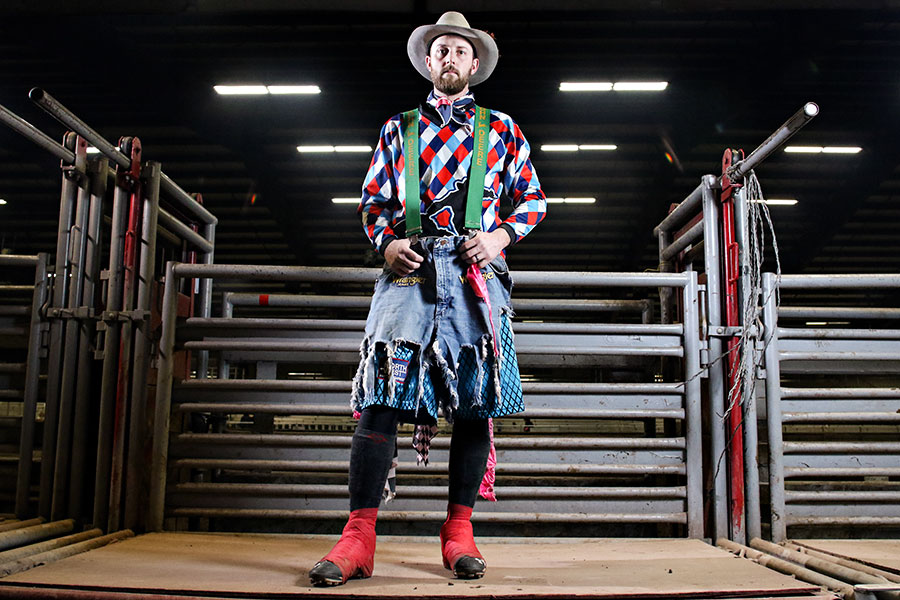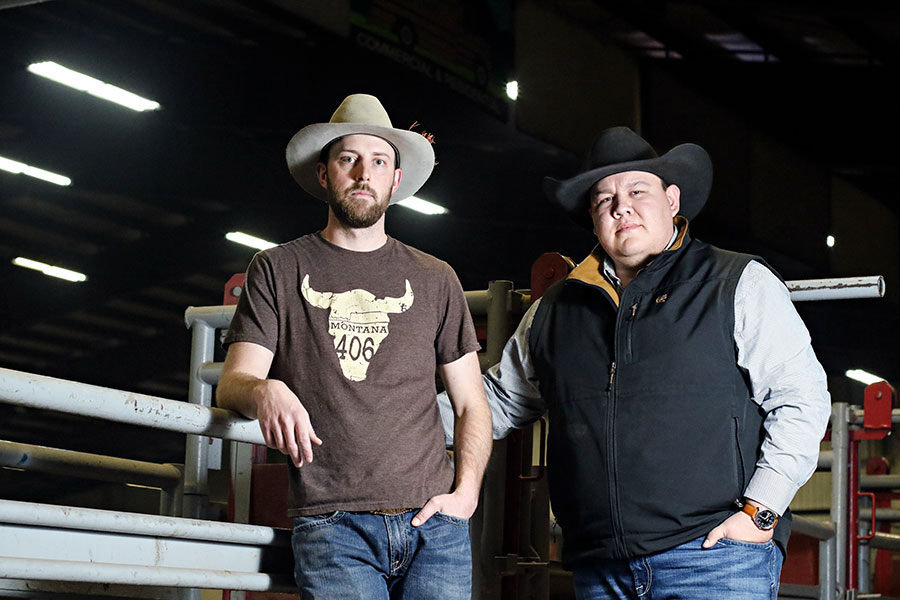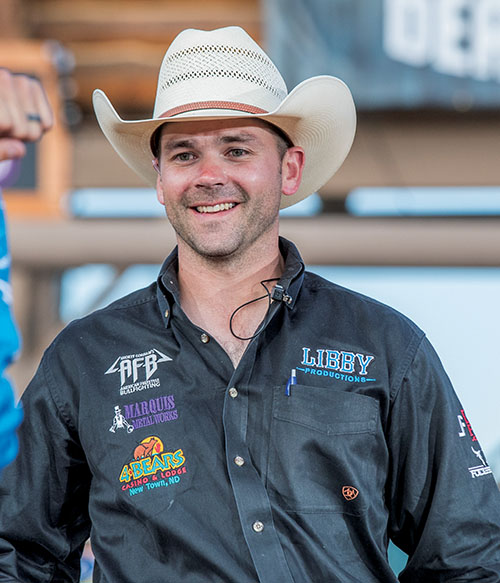Behind the Bulls
There’s more than one way to reach the highest levels of professional rodeo, as three men from the Flathead Valley, an unlikely rodeo hotbed, are proving
By Andy Viano
Many years ago, long before Adam Libby, Cody Morris and Brad Narducci were even born, Kalispell, Whitefish and Columbia Falls were filled with ranches.
Cowboys and cowgirls rose early to tend to their herd, rode into town to shop and blow off steam, and gathered back at home to raise their families. Gradually yet definitively, over the course of decades, things like urban sprawl, modern industry and out-of-towners took over the Wild West, and left little but lingering cowboy nostalgia in places like the Flathead Valley.
There are pockets, though, that never disappeared completely. Ranches can still be found in and around all three towns today, and ranchers still can find a place to kick up their boots and lasso a calf or two. Rodeo, a sport to those outside it and a lifestyle to those on the inside, has done wonders to keep what cowboys and cowgirls call the Western lifestyle alive in the Flathead Valley, and its pulse can be felt in outposts like the Blue Moon Nite Club in Columbia Falls and in the remote town of West Glacier. That’s where a tall, athletic cowboy named Beau Hill grew up and became one of the best bull riders in the world and, at the height of his 20-year career, maybe the best ever to come out of the state of Montana.
Hill retired in 2017 and by the time he did, whether he knew it or not, he had ushered in an unprecedented era for rodeo in the valley. Suddenly, kids like Libby, Morris and Narducci had someone to look up to, and so did a Columbia Falls youngster, Matt Triplett, who is in the midst of a spectacular career on the Professional Bull Riders (PBR) circuit. Hill and Triplett would sometimes train together, at a ranch owned by Matt’s father, Pat, between Columbia Falls and Kalispell. It’s the same place where Libby rode broncs, Morris fought bulls and Narducci spent hours with his best friend, Matt.
Fast-forward to the Bull Thing in Eureka, a PBR Touring Pro event, on Aug. 25, 2018. Matt Triplett was there, riding bulls in the midst of a season where he would finish 13th in the final world rankings. Narducci was running the music, one of more than 40 weekends he spent traveling the country last year. Morris was there, too, fighting some of the country’s most ferocious bulls. And Libby was in charge of the whole thing, promoting and producing the biggest event of the summer in Lincoln County.
“I think it’s about as unique as you can get, because this is not a rodeo-minded (region),” Pat Triplett, who also had some of the bucking bulls from his PBR-worthy stable with him in Eureka, said. “It’s like Beau Hill, he carried the torch. He probably inspired all these guys in a way, one way or another, even me. But for us all to start out in the same town …”
MEMBER EXCLUSIVE: Hear Brad Narducci and Cody Morris in their own words in this week’s Inside the Beacon, a bonus podcast just for members of the Editor’s Club. Not a member yet? Join for as little as $5/month at www.beaconeditorsclub.com.

Vance Brash, like Hill, Triplett and a handful of others, has had a crucial role in keeping rodeo alive in the Flathead Valley. His Brash Winter Series rodeos fill the schedule at Majestic Valley Arena in Kalispell, and it was there on Jan. 4 that Narducci was working as an announcer.
The 28-year-old Columbia Falls native is a “fifth-generation rodeo guy,” but his path to the sport was unclear in his early years. Narducci rode steers as a boy, but grew out of being able to compete on bulls shortly thereafter. He and Matt grew up together and were always close — Narducci will be Triplett’s best man at his wedding this summer — and after high school Narducci began helping Pat Triplett haul bulls to various events, but nothing seemed to fit just right.
“I didn’t know what I wanted to do, so I just kind of floated around the rodeo scene for 10 years,” Narducci said. “Then it was the summer of 2009, we showed up to this bull riding (in West Glacier) and Pat came to me and said, ‘The announcer didn’t show up,’ and I said, ‘What are we going to do? Are we going to cancel the bull riding?’”
Instead of canceling the event, Narducci stepped up to the mic.
Morris, also 28, grew up in Whitefish in the 1990s, about as far as one can get in Montana from a rodeo town. But he had the sport in his blood, even if he didn’t know it right away. His father, Dave, was a prominent bullfighter, a critical rodeo job that centers on protecting fallen bull riders from angry bulls after a ride is over. One day, Morris and a cousin found an old tape of his dad in action, exposing a past life Dave had left behind to raise his family.
“We watched those and we kind of went, ‘That’s pretty cool,’” Morris said. “And so we’d dress up for Halloween every year as rodeo clowns and bull fighters, the whole thing.”
Like most athletes, Morris’ sports career seemed to be over after high school, but the former football and baseball player still had the itch to do something competitive and athletic. So he asked his dad to introduce him to Mike Anderson, a bullfighter at the Blue Moon who Dave had trained years earlier.
“I started just watching for a while until (Anderson) finally let me put some pads on and try it every now and then,” Morris said. “That’s kind of how it all started. I loved it from day one.”

Libby, 33, was born in Oregon but raised in Kalispell where he tried just about everything to make it in the rodeo world. He was a roper and saddle bronc rider, and a reasonably successful one, but never on the national stage where he could have made a living.
Eventually he gave up that dream, moved with his wife, Desiree, to her hometown of Eureka, and started helping out with the Bull Thing, back when it was first becoming part of the PBR Touring Pro series, the sport’s top minor league. Still, with only one major rodeo every year passing through Eureka, Libby needed something else to turn his passion into a career.
“One night he called me and he was struggling in life a little bit, not knowing what direction to go,” Pat Triplett said. “And I told him, ‘Man, you need to go do this.’ It’s scary to venture out there to do something like this, but I encouraged him to go do what he does and, anyway, he went out and set the world on fire.”
With Triplett’s push, Libby became a promoter and rodeo producer full-time, started his own company, Libby Productions, and went chasing after his dream. Libby has never lacked charisma or confidence — he claims that as a 12-year-old he introduced himself to Desiree’s mom by saying, “I’m Adam Libby and I’m going to marry your daughter” — and has an innate knack for sales.
“There’s people out there that can sell fire to devil and make him think he got a good deal,” Triplett said of Libby.
What started for Libby in Eureka has since grown into a small empire, with Libby Productions now putting on more than 40 rodeos regionally every year, including seven PBR events, plus dozens of events in conjunction with Shorty Gorham’s American Freestyle Bullfighting. Last year, he and a partner created Nex-Gen Bull Fighting, a tour for young bull fighters that debuted in Kalispell in November.
One of Libby’s first major steps as a promoter came in 2016, when he went to Deadwood, South Dakota — the Wild West town where Wild Bill Hickock was gunned down during a card game — and started a rodeo there that became part of the PBR schedule. By that time, when he was looking for someone to run the music for the show, there was no one better in the business than Brad Narducci.
Since that fateful day in West Glacier, when Pat Triplett convinced him to handle the announcing and not cancel the show, Narducci has become one of the most sought-after music directors in the sport. He spent one summer in West Glacier, then spent the ensuing years as a DJ at weddings, clubs, bars and anywhere else someone would hire him. His big break came on a Wednesday in 2013 when a representative of the PBR called to ask him if he could be in Louisville, Kentucky three days later. He borrowed a few hundred bucks, left the auto repair shop where he was working at the time, and hopped on a plane.
“I was so nervous that I was puking before the show,” Narducci said. “I step up there to the announcer stand and I got my laptop music out and I remember I was shaking so bad that I couldn’t even click a button.”
Narducci pulled it together long enough to impress the PBR staff, and since then he’s been a music director on the PBR’s Velocity Tour, a nationwide circuit one step below the top level. Narducci works a total of 42 weekends every year, including at the PBR World Finals in Las Vegas, where he’s worked three times.
Morris, meanwhile, can be found fighting bulls at three of Libby’s PBR rodeos — Deadwood, Eureka and New Town, North Dakota — and works about 70 nights every year, in between his day job for the City of Whitefish and helping to raise three kids ages 4 and younger. Most of his time in rodeo is spent with the National Rodeo Association, where he was named the organization’s Bullfighter of the Year for the third time in 2018. Morris, too, was working the Brash Winter Rodeo last weekend.
“When I was in school, we didn’t have these, so I didn’t have a place to go watch the rodeo close by other than the (county) fair every year,” Morris said. “Since Vance has started these it’s pretty cool — families get to come out and watch. It’s something new around here.”
Pat Triplett, too, brought his bulls to the Brash event. The evening turned into both a reunion and a new beginning, they all hoped, for the next generation’s Beau Hill, Matt Triplett or, even, Brad Narducci.
“Guys like Vance and his fiancée, they bust their (butt) to keep people involved in the rodeo, keep the sport going in the valley,” Triplett said. “If there wasn’t guys like him, I think it would go away. I think our way of life in the cowboy community would be gone.”